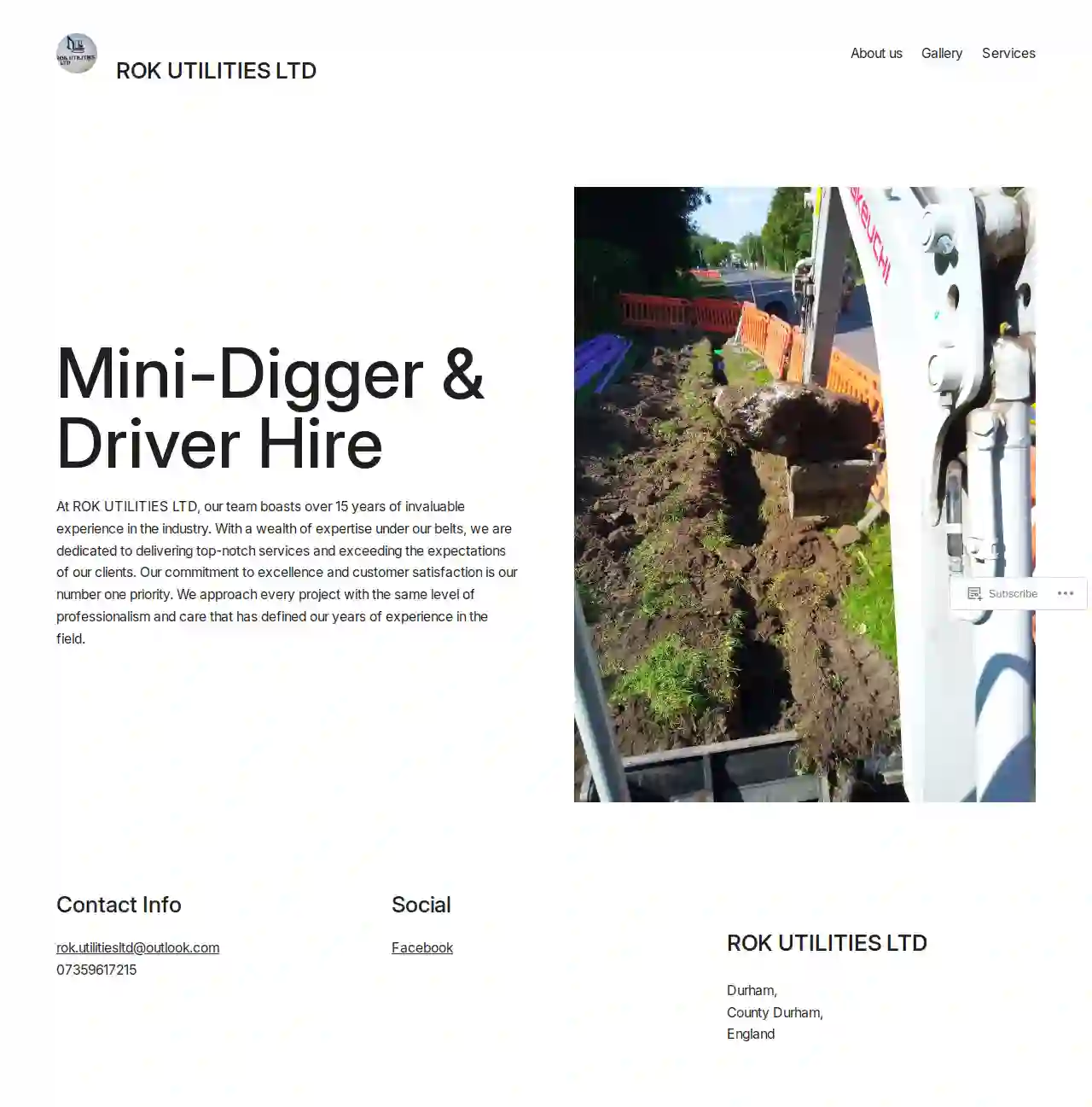Excavation Contractors Ushaw Moor
Find top Excavation Company Near Me in Ushaw Moor
Receive up to 3 Excavation Contractor quotes for your project today! Compare profiles, reviews, accreditations, portfolio, etc... and choose the best service.

Rok utilities ltd
51 reviewsDurham, County Durham, GBAbout ROK UTILITIES LTD At ROK UTILITIES LTD, our team boasts over 15 years of invaluable experience in the industry. With a wealth of expertise under our belts, we are dedicated to delivering top-notch services and exceeding the expectations of our clients. Our commitment to excellence and customer satisfaction is our number one priority. We approach every project with the same level of professionalism and care that has defined our years of experience in the field.
- Services
- Why Us?
- Gallery
Get Quote
JW Plant Hire & Excavation
54 reviewsDurham, GBJW Plant Hire & Excavation We are a reliable and hardworking family run business, located in County Durham. Providing excavation services and micro plant machinery hire, in and around the North East of England. I'm committed to providing a high standard of service. No matter the size of the job, I guide my clients every step of the way and offer highly competitive rates. Take a look at my services below and call me today to schedule an initial consultation.
- Services
- Why Us?
- Gallery
Get Quote
Brambledown Landscape Services Ltd
12 reviewsDurham, GBWelcome To Brambledown Brambledown Landscape Services Ltd have 50 years experience in providing Award winning commercial Landscape Environmental Improvement schemes across the UK. Our specialist Landscape work has vastly improved numerous public spaces, particularly Historic Parks, Community gardens, National Parks, Botanical Gardens and Town Parks. Recognising the time and money spent invested in these projects, Brambledown Landscapes have ensured that every Environmental Improvement scheme that we are involved in, meets our strict high level quality procedures in line with Achilles Building Confidence Level 4 Status, ISO 9001, Constructionline Gold & CHAS.
- Services
- Why Us?
- Gallery
Get Quote
Herrington Landscapes Ltd
522 reviewsDurham, GBHERRINGTON LANDSCAPES Bespoke garden design & installation With over 14 years of experience Herrington Landscapes can work with you to create a bespoke garden design & installation. Let us take care of your dream garden.
- Services
- Why Us?
- Testimonials
- Gallery
Get Quote
G M H Mini Plant Hire & Groundworks
High Hillside Farm, Houghton Le Spring, DH5 8BG, GBWelcome to G M H Mini Plant Hire & Groundworks, a trusted family-run business with a proud 9-year legacy. Serving Newcastle, Houghton Le Spring and beyond, we have earned an excellent reputation for plant hire and groundworks excellence. At G M H Mini Plant Hire & Groundworks, we provide professional and swift service, always maintaining the highest quality standards. Our communication with customers is exceptional, ensuring a smooth experience from beginning to end. A guarantee of superior work backs each project we undertake. Our business thrives on customer satisfaction and positive referrals. With a history of inventive designs, effective problem-solving, and attention to detail, we aim to meet and surpass the expectations of every customer. From minor domestic tasks to extensive commercial projects, we handle each job with precision and care. We are also proud members of the Construction Plant-Hire Association and hold certifications like the First Aid Awards Ltd Emergency First Aid at Work Level 2 Award and the Construction Skills Certification Scheme.
- Services
- Why Us?
- Accreditations
- Testimonials
- Gallery
Get Quote
GROUNDWORKS DIRECT LTD
2.712 reviewsDurham, GBWhat is Plesk? Plesk is a hosting panel with simple and secure web server, website and web apps management tools. It is specially designed to help web professionals manage web, DNS, mail and other services through a comprehensive and user-friendly GUI. Plesk is about intelligently managing servers, apps, websites and hosting businesses, on both traditional and cloud hosting.
- Services
- Why Us?
Get Quote- Wi
Wilf Husband
4.68 reviewsDurham, GB- Services
- Why Us?
Get Quote - Ni
Nicholsons Plant hire
4.510 reviewsDurham, GB- Services
- Why Us?
Get Quote - Bi
Bishop Middleham Quarry
4.766 reviewsDurham, GB- Services
- Why Us?
Get Quote 
H. E. Services (Plant Hire) Ltd
53 reviewsDurham, GB- Services
- Why Us?
Get Quote
Over 13,059+ Excavation Contractors in our network
Our excavation companies operate in Ushaw Moor and beyond!
ExcavationHQ has curated and vetted Top Excavation Pros in Ushaw Moor. Find a top & trustworthy pro today.
Frequently Asked Questions About Excavation Contractors
- Experience: Choose contractors with a proven track record and years of experience in excavation projects similar to yours.
- Licensing and Insurance: Verify that they are properly licensed to operate in your area and carry adequate insurance to protect you from liability in case of accidents or damage.
- Equipment and Resources: Ensure they have the necessary equipment and resources to handle your project efficiently and safely.
- Positive Reviews and References: Check online reviews and testimonials from previous customers. Request references and contact them to inquire about their experience with the contractor.
- Professionalism: Opt for a company that communicates clearly, provides detailed and transparent estimates, and has a responsive and courteous team.
- Project Size and Scope: The larger and more complex the excavation, the higher the cost.
- Soil Type: Different soil types require different equipment and techniques, impacting costs. Rocky or clay-rich soil can be more expensive to excavate than loose soil.
- Accessibility: Difficult-to-access sites might require specialized equipment or additional labor, increasing expenses.
- Disposal Costs: Hauling away excavated material (soil, rocks, etc.) to disposal sites incurs additional fees.
- Permits and Inspections: Depending on local regulations, permits and inspections might be required, adding to the overall cost.
- Project Size and Scope: Larger, more complex excavations naturally take longer.
- Soil Conditions: Rocky or challenging soil types can slow down progress.
- Site Accessibility: Limited access might require more time for maneuvering equipment and hauling materials.
- Weather: Inclement weather can cause delays.
- Permitting and Inspections: Waiting for permits or inspections can extend the timeline.
- Clear the Area: Remove any obstacles, including vehicles, outdoor furniture, landscaping features, or structures, from the excavation zone and surrounding area.
- Mark Existing Features: Identify and mark underground utilities, septic tanks, sprinkler systems, or other buried elements you want to protect.
- Protect Landscaping: Use tarps or fencing to shield trees, shrubs, gardens, or other landscaping elements from damage.
- Provide Access: Ensure the excavation contractor has clear access to the work area, including gates wide enough for equipment.
- Discuss Logistics: Coordinate with the contractor regarding parking arrangements, material delivery, and any special instructions or concerns you might have.
How do I find a good excavation contractor?
How much does excavation cost?
How long does an excavation project take?
How do I prepare my property for excavation?
How do I find a good excavation contractor?
- Experience: Choose contractors with a proven track record and years of experience in excavation projects similar to yours.
- Licensing and Insurance: Verify that they are properly licensed to operate in your area and carry adequate insurance to protect you from liability in case of accidents or damage.
- Equipment and Resources: Ensure they have the necessary equipment and resources to handle your project efficiently and safely.
- Positive Reviews and References: Check online reviews and testimonials from previous customers. Request references and contact them to inquire about their experience with the contractor.
- Professionalism: Opt for a company that communicates clearly, provides detailed and transparent estimates, and has a responsive and courteous team.
How much does excavation cost?
- Project Size and Scope: The larger and more complex the excavation, the higher the cost.
- Soil Type: Different soil types require different equipment and techniques, impacting costs. Rocky or clay-rich soil can be more expensive to excavate than loose soil.
- Accessibility: Difficult-to-access sites might require specialized equipment or additional labor, increasing expenses.
- Disposal Costs: Hauling away excavated material (soil, rocks, etc.) to disposal sites incurs additional fees.
- Permits and Inspections: Depending on local regulations, permits and inspections might be required, adding to the overall cost.
How long does an excavation project take?
- Project Size and Scope: Larger, more complex excavations naturally take longer.
- Soil Conditions: Rocky or challenging soil types can slow down progress.
- Site Accessibility: Limited access might require more time for maneuvering equipment and hauling materials.
- Weather: Inclement weather can cause delays.
- Permitting and Inspections: Waiting for permits or inspections can extend the timeline.
How do I prepare my property for excavation?
- Clear the Area: Remove any obstacles, including vehicles, outdoor furniture, landscaping features, or structures, from the excavation zone and surrounding area.
- Mark Existing Features: Identify and mark underground utilities, septic tanks, sprinkler systems, or other buried elements you want to protect.
- Protect Landscaping: Use tarps or fencing to shield trees, shrubs, gardens, or other landscaping elements from damage.
- Provide Access: Ensure the excavation contractor has clear access to the work area, including gates wide enough for equipment.
- Discuss Logistics: Coordinate with the contractor regarding parking arrangements, material delivery, and any special instructions or concerns you might have.